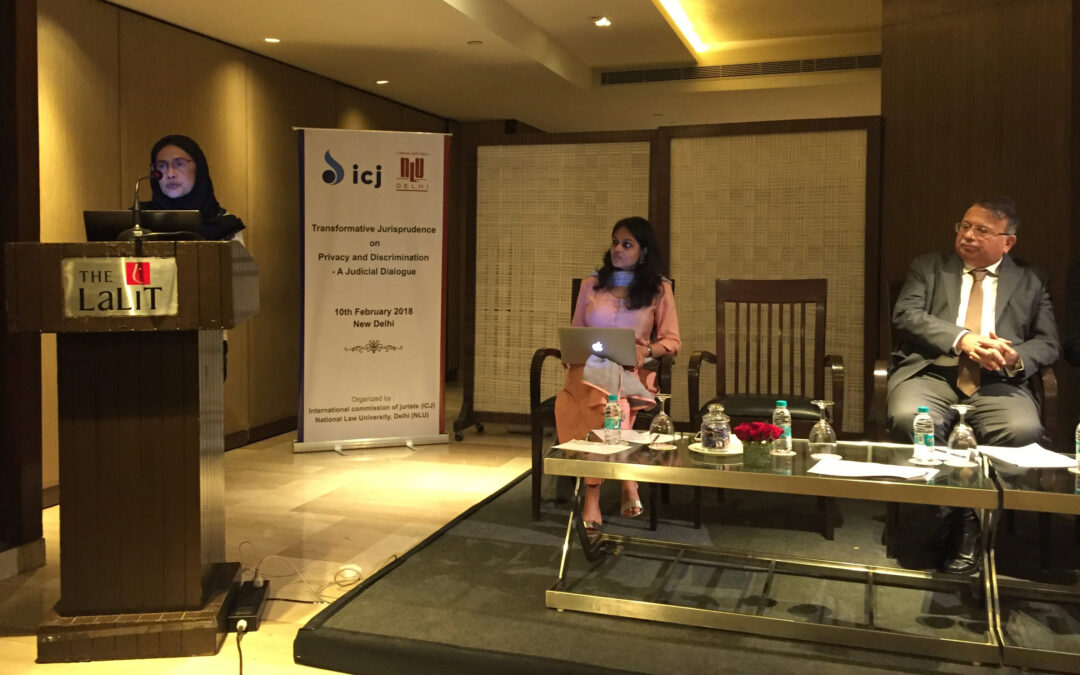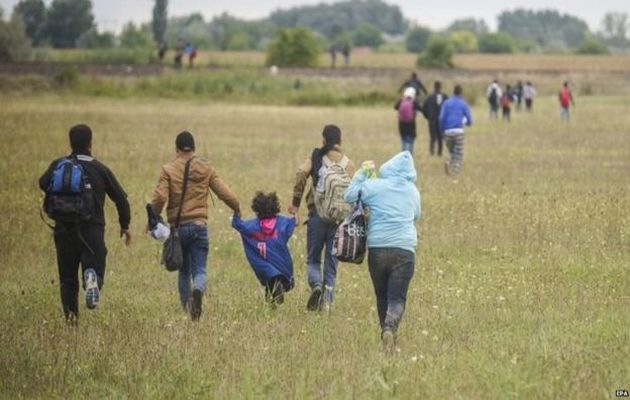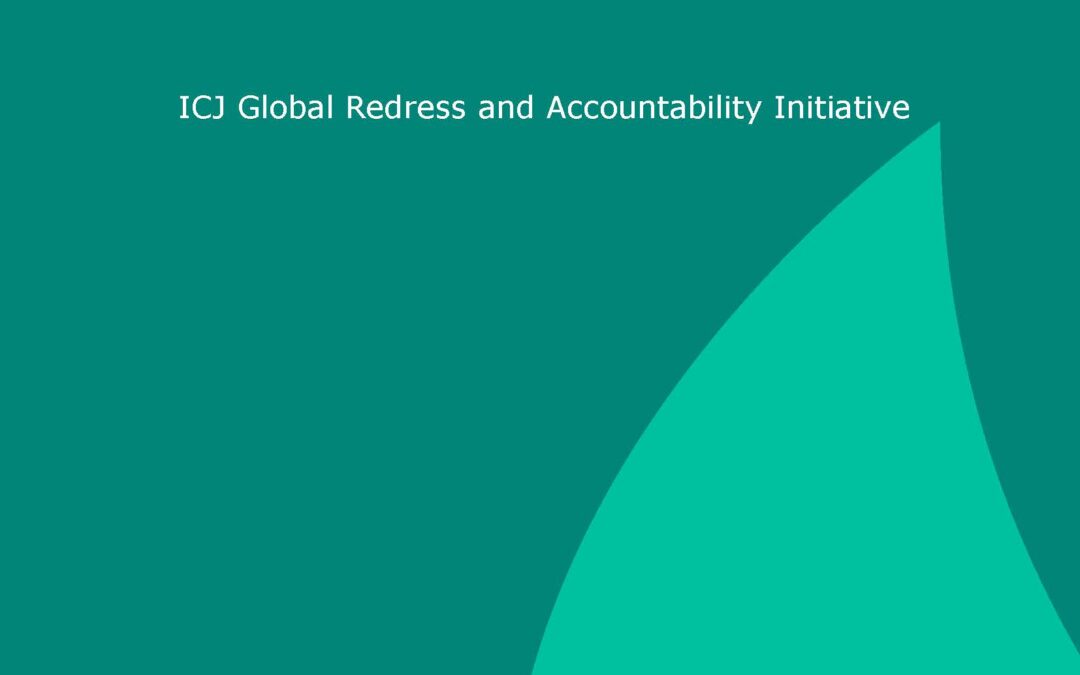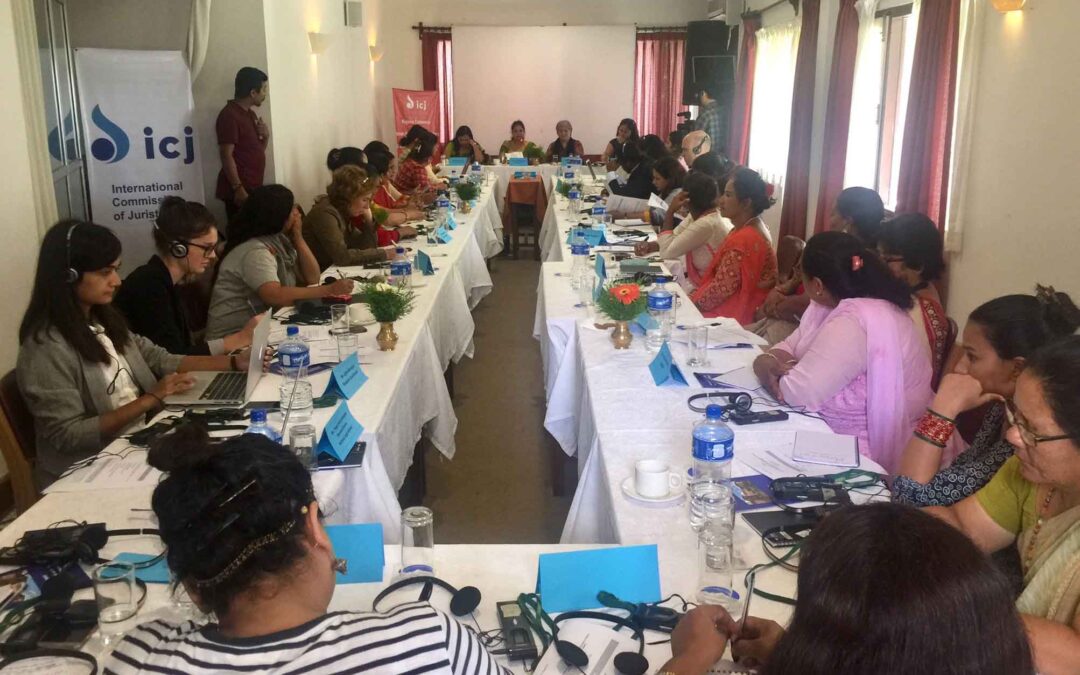
Feb 11, 2018 | News
On 10 February 2018, the ICJ, in partnership with the National Law University, Delhi (NLU), organized a judicial dialogue on transformative jurisprudence on privacy and discrimination.
Participants included judges from the Supreme Court of India, the High Court of Delhi, and the District Courts of Delhi; ICJ Commissioners: Justice Ajit Prakash Shah, from India, who made the event possible through his support, Justice Kalyan Shrestha, from Nepal, Justice Adolfo Azcuna, from the Philippines; a Commissioner of Thailand’s National Human Rights Commission; and lawyers and activists from India. The judicial dialogue examined the relationship between the right to privacy, the principle of non-discrimination, and the right to equality before the law, in the context of one’s sexual orientation and/or gender identity, as well as in light of the jurisprudence of the Indian Courts.
It pursued the ICJ’s larger goal of addressing the need for sustained, ongoing engagement with the Indian judiciary on LGBTI rights, to facilitate better access to justice for the LGBTI community, with the help of a sensitized judiciary.
The discussions lent support to domestic advocacy efforts directed at other State and non-State actors to get them to better address and reduce discriminatory treatment and homophobic and transphobic attitudes towards LGBTI communities by challenging discriminatory laws and practices.
The dialogue underscored the different facets of the dynamic right of privacy in relation to the human rights of disenfranchised communities, and discussed sexual orientation and gender identity as essential attributes of one’s identity deserving of and entitled to protection.
The conversation touched upon emergent challenges in the privacy debate, in light of technological advances, critiquing the Indian Government’s unique identification project whereby the Government’s programme of issuing a 12-digit unique identity number to all Indian residents based on their biometric and demographic data, and which will be needed to access government and private sector services, is currently being contested in the Supreme Court on account of privacy concerns.
The speakers emphasized the importance of the right to be forgotten and the right to limit one’s audience as essential to a right to privacy, given the increasing importance of the internet.
The speakers also highlighted the need for the judiciary to uphold fundamental rights enumerated in the constitution instead of pandering to populist beliefs and mores
There was unanimous agreement among the judges and the extended legal community that Section 377, Indian Penal Code, which criminalizes “voluntary carnal intercourse against the order of nature” needs to be struck down, to facilitate progress in developing a rights framework for sexual minorities.
There was criticism of other discriminatory laws, including draft legislation, such as the current Indian Transgender Persons (Protection of Rights) Bill, 2016 for its denial of an individual’s right to self-identify one’s gender.
The speakers reiterated the need for a comprehensive effort from the Indian judiciary, and other State actors with a focus on judicial training and sensitization, as well as police reform, to ensure that India is able to fulfill its international and constitutional obligations to respect, protect, and fulfill the rights of the LGBTI community.
A common theme was the importance of comparative and international law in the development of Indian jurisprudence.
The speakers discussed the ‘Yogyakarta Principles on the Application of International Law in Relation to Issues of Sexual Orientation and Gender Identity’ at length, and the growing prominence of these Principles in Indian jurisprudence, as reflected in the Puttuswamy and National Legal Services Authority v. Union of India judgments, both of which quoted the Yogyakarta Principles extensively.
The dialogue focused on the role of the judiciary, the need for sensitization regarding the human rights violations of the LGBTI community among the judiciary in India and South and South East Asia and, in that context, the importance of judicial dialogues.
ICJ Commissioner Justice Shrestha emphasized that South Asian judges have typically played a more important role than the legislature in advancing human rights.
He discussed the importance of judicial creativity in providing remedies, and emphasized that training programs must include best practices and that judicial training programs must be imparted regularly.
The dialogue stressed the importance of judicial trainings highlighting the role that Justice Cameron and Justice Kirby, both former ICJ Commissioners, have played in raising awareness about the relationship between human rights and issues of sexuality, HIV/AIDS and gender identity in India.
It reiterated the importance of judges being in touch with people’s lived realities, and thus the importance of encouraging judiciary’s interaction with the LGBTI community.
For more information: maitreyi.gupta(a)icj.org

Jan 22, 2018 | News
The ICJ today called on the Egyptian Parliament to adopt a Draft Law on the appointment of women to the judiciary and to eliminate longstanding discrimination against their appointment as judges.
The Draft Law was introduced by member of the Parliament (MP) Nadia Henry this month and is supported by another 60 MPs.
The Speaker of Parliament has referred it to the legislative committee for review.
“Ensuring women’s full and equal participation in Egypt’s judiciary is necessary for a fair legal system reflective of the community it serves,” said Said Benarbia, ICJ MENA Director.
“It’s also necessary to end decades of discriminatory practices that have meant only a handful of women judges have ever been appointed despite explicit guarantees of equality in the Constitution,” he added.
Article 11 of the Constitution requires the State to ensure the “achievement of equality between women and men in all civil, political, economic, social and cultural rights,” including the right of “holding public and senior management offices in the state and their appointment in judicial bodies and authorities without discrimination”.
Women were first appointed to judicial office in 2007. Between 2007 and 2017 there were less than 67 female judges across Egypt, for a population of more than 100 million.
This significant under-representation of women is entrenched in a widespread discriminatory view, including within the judiciary itself, that working as a judge in court was an inappropriate profession for women.
“The Draft Law is significant first step towards challenging these discriminatory views and harmful practices. The Authorities must not only adopt it, they must also adopt other urgent, practical and structural measures to fully guarantee the rights of women to have equal access to judicial office and ensure their equal representation in the judiciary,” Benarbia added.
Background
The first article of the draft law places an obligation on all judicial bodies to appoint women to judicial offices and ensure that the conditions of their appointment are consistent with those that are applicable to men.
In its second article, the draft law nullifies any law that infringes on the obligation set forth in Article 1. Article 3 of the draft law invalidates any procedures in relation to the appointment of judges if such procedures do not comply with the Article 1 of the draft law.
Article 10 of the UN Basic Principles on the Independence of the Judiciary provide that, “In the selection of judges, there shall be no discrimination against a person on the grounds of race, colour, sex, religion, political or other opinion, national or social origin, property, birth or status…”.
The Convention for the Elimination of Discrimination against Women and the International Covenant on Civil and Political Rights, key human rights treaties to which Egypt has been party since the early 1980s, also explicitly prohibit discrimination against women, including in relation to access to public office such as judicial appointments.
Contact
Saïd Benarbia, Director of the ICJ Middle East and North Africa Programme, t: +41.22.979.3817, e: said.benarbia(a)icj.org
Egypt-women judges-news-2018-ARA

Nov 23, 2017 | Agendas, Events, News
The ICJ delivers today and tomorrow a training for judges on asylum, migration and international human rights law, including non-discrimination, organised by OSCE and the Judicial Academy.
The training, that takes place in the capital Belgrade, will be delivered to judges of all level of jurisdiction of Serbian courts.
It will focus on human rights law related to the entry of migrants, including refugees, to the territory of a State, to the State’s obligations on international protection, the rules applicable to detention of foreign national and their rights, and the prohibition of non-discrimination.
Serbia-Training-MIgrationAsylum-OSCEJA-2017-eng (download the agenda in English)

Oct 18, 2017 | News, Publications, Reports, Thematic reports
Cambodia is “weaponizing” the law and relying on judges and prosecutors who lack independence to silence dissent and dismantle democracy, says the ICJ in a report released today.
The release of the report Achieving Justice for Gross Human Rights Violations in Cambodia follows Monday’s unanimous decision of the National Assembly, attended only by law-makers from the ruling Cambodian People’s Party (CPP), to amend four election laws which would redistribute parliamentary seats held by the opposition Cambodia National Rescue Party (CNRP) to several minor parties in the event of the CNRP’s dissolution.
A Senior Cambodian CPP law-maker, Cheam Yeap, was reported as saying that the amendments were made “especially for the treasonous acts of the president of the CNRP, Kem Sokha, who committed treason in a red-handed crime.”
“These amendments are the latest in a long line of instances where the Government has shamelessly passed or amended laws with the specific purpose of legally harassing perceived opponents or weakening representative democracy within the country,” said Kingsley Abbott, Senior International Legal Adviser at the ICJ’s regional office in Bangkok.
Also of concern is that the Government is increasingly defending its actions by claiming it is merely applying the rule of law.
In a statement released by the Permanent Mission of Cambodia to the United Nations in Geneva on Monday, the Government claimed that “Prosecuting and punishing offenders by legitimate authorities, for the interest of justice, should not be read as a menace to democracy and human rights, but rather as an enforcement of the rules of law…upholding the rules of law means holding perpetrators accountable for their conducts”.
“The ‘rule of law’ is not only about passing and implementing laws, but rather ensuring they are drafted and applied in accordance with international human rights law and without discrimination, including discrimination based on political or other opinion,” added Abbott.
The ICJ’s report, which is being released against the backdrop of a rapidly deteriorating human rights situation, records that the “single largest problem facing the Cambodian justice system is the lack of independent and impartial judges and prosecutors,” which includes “an endemic system of political interference in high-profile cases and an equally entrenched system of corruption in all others”.
Contact
Kingsley Abbott, Senior International Legal Adviser, ICJ Asia Pacific Regional Office, t: +66 94 470 1345, e: kingsley.abbott(a)icj.org
Alex Conte, ICJ Global Redress and Accountability Initiative, t: +41 79 957 2733; e: alex.conte(a)icj.org
Background
On 3 September 2017, the leader of the CNRP, Kem Sokha, was arrested in a raid at his home and taken away by more than 100 policemen.
On 5 September 2017, the Phnom Penh Municipal Court formally charged Kem Sokha under Article 443 of the Cambodian Penal Code for alleged ‘collusion’ with foreign actors to “cause chaos” in Cambodia, otherwise known as treason.
On 6 October 2017, the Ministry of Interior filed a request to the Supreme Court to seek the dissolution of the CNRP pursuant to the Law on Political Parties, which was amended twice in 2017, and allows for the Supreme Court to dissolve political parties in certain circumstances including if one of the leadership is convicted of a crime.
The amendments to the four election laws would also mean that at the district and commune levels, in places where the CPP received the next highest number of votes, vacant seats would be redistributed to the CPP.
Download
Cambodia-GRA Baseline Study-Publications-Reports-Thematic reports-2017-ENG (full report in PDF)
Live Media Event
Watch the media event on the Human rights and democracy crisis in Cambodia live from the Foreign Correspondents’ Club of Thailand in Bangkok on FORUM-ASIA’s Facebook page
It starts at 10.00 Bangkok time (05:00 CET and 03:00 GMT).
Read also
Cambodia and the Rule of Law: UN Statement
Cambodia: UN Human Rights Council urged to address unfolding human rights crisis

Aug 29, 2017 | News
Today, the ICJ concluded its Regional Conference on Women Human Rights Defenders as Political Actors, which gathered in Kathmandu women human rights defenders (WHRDs) from all over Nepal who were recently elected during the local elections in May 2017.
They were joined by Bushra Gohar, a former Member of Parliament in Pakistan, Ahmed Naaif of the Maldivian Democracy Network, and Sherene Xavier, a filmmaker and WHRD from Sri Lanka.
The discussions focused on how the newly-elected WHRDs can continue to advance human rights in their new roles as elected officials.
Under Nepal’s Local Level Election Act 2017, political parties are required to field female candidates for half of the executive posts (mayor/deputy mayor) and at least 40% for membership at the local community councils.
In May 2017, during the first local election held in the country in almost 20 years, approximately 20,000 women stood for elections, including WHRDs.
Most of the women candidates, however, were fielded by the political parties for the deputy mayor posts. At least 92% of the candidates fielded for the mayoral posts were men.
The discussions during the two-day conference (28-29 August 2017) focused on how these affirmative measures should be utilized by women human rights defenders in Nepal to advance equal participation of women in public affairs and further their advocacy for human rights.
There was some caution expressed by some of the women that these measures may reinforce the already disadvantaged place women hold in public life and may also be viewed as tokenism.
Participants in the conference discussed as well how as WHRDs, they would need to deal with human rights abuses allegedly committed by their political parties against women.
The need for WHRDs in politics to have their own support system was also emphasized during the conference.
The participants of the conference ran under the banner of various political parties in Nepal.
The National Alliance of Women Human Rights Defenders of Nepal collaborated with ICJ in organizing the conference.
The conference was opened with a keynote speech from Justice Sapana Pradhan Malla of the Supreme Court of Nepal, who spoke about the challenging path women politicians face.
Former Chief Justice Kalyan Shrestha, Commissioner of the ICJ, chaired the opening ceremonies.









